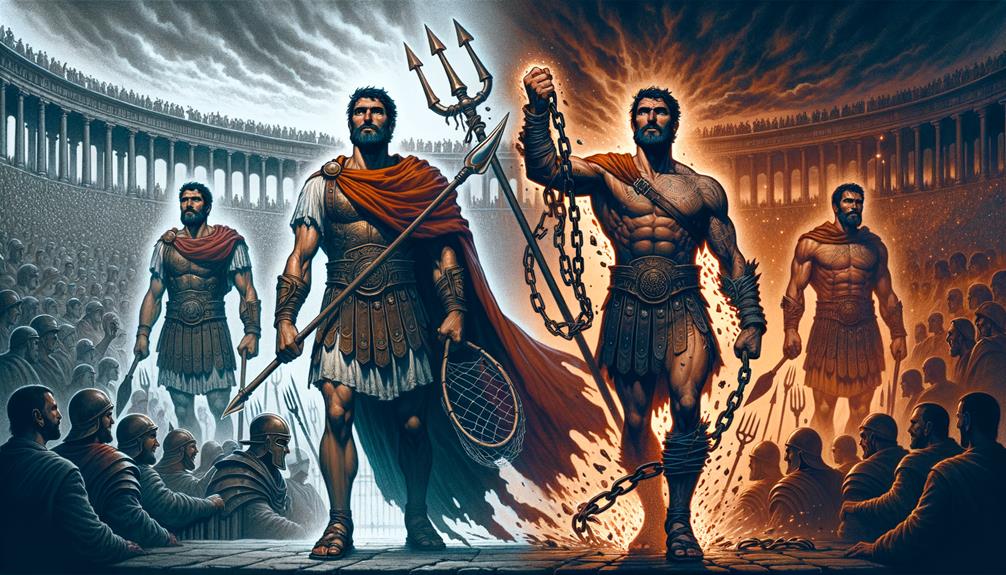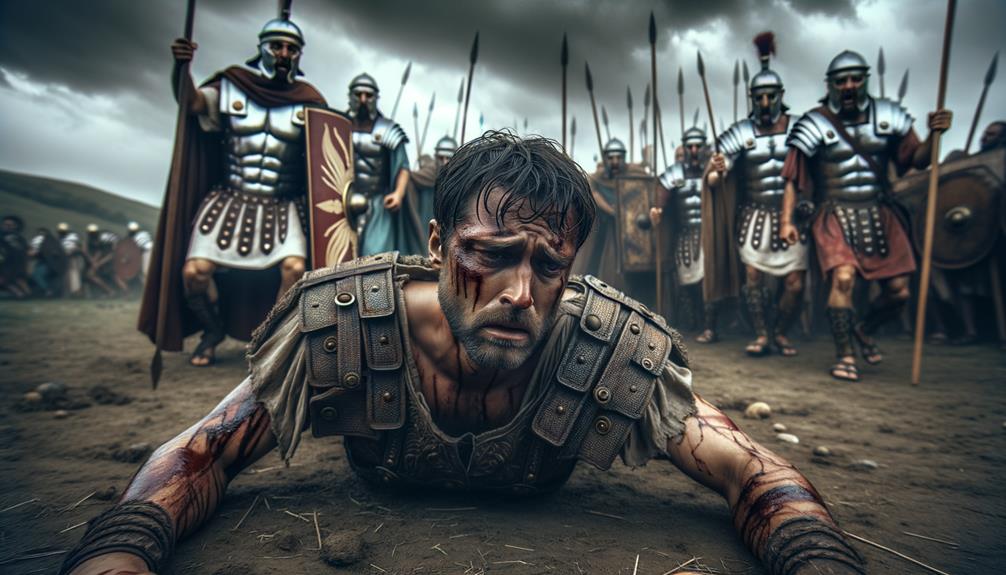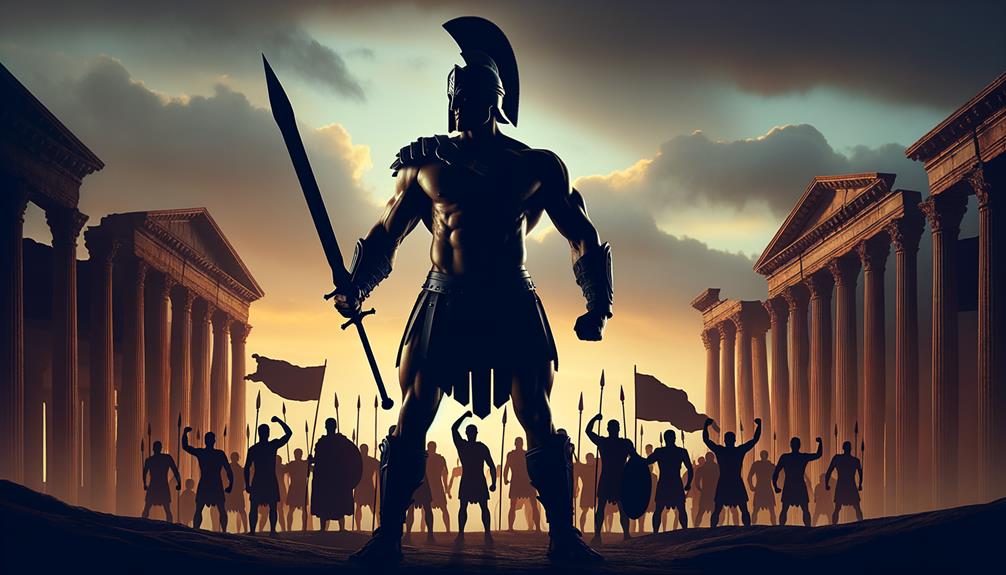Spartacus: The Thracian Gladiator Who Emerged as a Revolutionary Leader
Discover the riveting tale of Spartacus, the Thracian gladiator who evolved into a brave rebel leader. His compelling transformation from a life of enslavement to a beacon of resistance against the mighty Roman Republic has captivated my interest. Spartacus' fascinating story, wrapped in layers of myth and history, echoes that of Prometheus, the defiant figure who dared to challenge the powerful to bring about change.
Yet, Spartacus' narrative is not a simple reflection of the Thracian Prometheus. There are stark differences that make his story uniquely intricate and complex. This invites us to delve deeper into his life, his uprising, and the reasons why his legacy continues to echo in our times.
Spartacus: More Than a Thracian Prometheus
Spartacus' story isn't a mere retelling of the Thracian Prometheus' tale. There are distinct differences – and these contrasts add layers of complexity, making his narrative truly exceptional. This compelling complexity encourages us to delve further into examining his life, his rebellion, and his enduring legacy.
The Gladiator Who Defied Rome: Spartacus, the Revolutionary
Spartacus was a Thracian gladiator who rose to power as a resistance leader, challenging the might of the Roman Republic. His story, equally steeped in myth and history, draws parallels to Prometheus, another figure who defied the powerful to instigate change. However, Spartacus' tale isn't a simple carbon copy of the Thracian Prometheus. There are several contrasting elements that add depth and nuance to his narrative.
The Rebellion that Resonates Today: Spartacus' Enduring Legacy
The legacy of Spartacus, the gladiator-turned-rebel leader, continues to resonate even in the modern era. His transformation from an enslaved gladiator to a powerful resistance leader, his defiance of the Roman Republic, and his story interwoven with both myth and history, all contribute to his enduring influence. However, it's not just these aspects that make his narrative intriguing. The contrasting elements that set him apart from the Thracian Prometheus add an unusual complexity to his tale, compelling us to explore him further. His story isn't just unique – it's riveting, engaging, and continues to inspire today.
The Early Life of Spartacus

The Formative Years of Spartacus: A Journey from Slavery to Leadership
Born into the roving Thracian Maedi tribe, Spartacus' early years were defined by harsh conditions, ultimately thrusting him into the savage realm of gladiatorial combat by his 30th birthday. The details of this period remain shrouded in mystery, yet it's clear that he initially served as a Roman soldier before deserting and finding himself shackled in chains.
His path led him to a gladiatorial training school in Capua, a place that served as a crucible, molding him into a fearsome Thracian gladiator, a murmillo of great renown. The grueling regimen of the school, paradoxically, equipped him for his future as a leader.
In contrast to the fabled heroes of his native land whose destiny was determined by the gods, Spartacus, a Roman slave, seized his fate with determination and grit. Orchestrating an escape with approximately 70 fellow slaves, he spearheaded a rebellion against the Roman tyranny. What began as a small uprising quickly expanded, spotlighting Spartacus' tactical brilliance and unparalleled leadership skills.
His early years, filled with adversity and struggle, honed him into a leader of distinction, a beacon of hope for the downtrodden, and a symbol of resistance that continues to resonate through history.
Spartacus: An Icon of Resistance
Spartacus' journey is not just a tale of a slave turned gladiator, but a testament to his indomitable spirit and leadership. His life story lays bare his tactical acumen, his ability to inspire his fellow slaves, and his relentless pursuit of freedom against all odds. This makes Spartacus a historical figure worth remembering, an icon of resistance against oppression.
*"Spartacus was a beacon of hope for the oppressed, a symbol of resistance that continues to resonate through history."*
In the end, it was not the gods who dictated his journey, but his undying spirit that emerged victorious. His life serves as a reminder that no matter how dire the circumstances, the human spirit is capable of extraordinary feats. Spartacus' story is a testament to courage, resilience, and the will to fight against oppression.
Spartacus: From Gladiator to Rebel

The Remarkable Journey of Spartacus: Gladiator Turned Revolutionary
Diving into the extraordinary journey of Spartacus, we encounter a Thracian warrior who transitioned from a formidable gladiator to a daring revolutionary. This hero not only initiated a revolt against the colossal power of the Roman Republic, but also managed to amass a following that numbered in the thousands. His story, forever etched in historical records, stands as a beacon of defiance against tyranny.
Spartacus' metamorphosis from gladiator to revolutionary was catalyzed by his daring escape from a gladiatorial school. This event sparked the formation of an army comprised entirely of escaped slaves. It was the birth of a significant event in history- the Third Servile War, a slave uprising that stood as a stark challenge to Roman authority. Shouldering the leadership of this rebellion, Spartacus exhibited extraordinary military skill, claiming victory in numerous battles against Roman legions.
However, it's important to note that Spartacus' tale culminates in a heartbreaking downfall. Despite his heroic efforts and initial victories, his rebellion was ultimately squashed under the power of Marcus Licinius Crassus. The Roman Empire, with its vast resources and relentless determination, proved to be an insurmountable adversary. Nevertheless, Spartacus, the Thracian gladiator-turned-revolutionary, continues to live on in our shared memory. His audacious stand against a despotic regime continues to strike a chord, bearing testimony to his enduring legacy.
*“Spartacus is not just a name. It is a symbol, a symbol of resistance against oppression.”*
The story of Spartacus is an incredible one, filled with valor, audacity, and persistence. It is a tale that resonates with people across the world and across the ages, reminding us that even in the face of overwhelming odds, it is possible to stand up and fight for what is right. His story continues to inspire and will continue to do so for generations to come. From a humble gladiator to a revered leader, Spartacus' journey is a testament to the indomitable spirit of humanity.
The Third Servile War Explained
Diving Deeper into Spartacus' Epic Tale: The Third Servile War
In the annals of history, Spartacus, a former gladiator turned revolutionary, indelibly inked his name with the saga of the Third Servile War. This audacious uprising against the Roman Republic was ignited by Spartacus himself – a slave, gladiator, and a leader hailing from Thracia. Equipped with the military skills honed during his gladiatorial tenure, he boldly stood up to Rome's formidable might.
To fully appreciate this historical event, let's delve into these crucial details:
Spartacus' Unlikely Army:
Spartacus' forces, initially a small band of 70 escapees, burgeoned into a formidable army of an estimated 70,000. This group was a diverse fusion of Celts, Gauls, and even Roman legion veterans, highlighting the wide-ranging appeal of Spartacus' cause.
Tactical Genius:
Spartacus' guerilla warfare strategies repeatedly perplexed the Roman forces, showcasing his exceptional military prowess.
The Final Stand:
Despite his strategic genius, Spartacus met his end in the climactic battle of this war, marking the conclusion of the largest slave rebellion in ancient history.
The story of the Third Servile War is more than a tribute to the indomitable spirit of one man. It is a stark reminder of Rome's relentless power. However, even in defeat, Spartacus' tale continues to resonate, his legacy forever intertwined with the human struggle against subjugation.
"Even in defeat, Spartacus' story continues to inspire, his name etched forever in the saga of human resilience against oppression."
This tale of courage and resistance not only provides a fascinating insight into a pivotal moment in history but also serves as a timeless source of inspiration. It's a testament to the resilience of the human spirit and the everlasting fight for freedom.
The Fall and Death of Spartacus

The Epic Confrontation: Spartacus' Stand Against Roman Legions
As we delve into the final chapter of Spartacus' daring revolt, we witness his heroic last stand against the intimidating force of Roman legions. This epic showdown ultimately sealed his reputation as a timeless symbol of defiance and fortitude. The Roman legions, previously shamed by Spartacus, now mercilessly sought vengeance. The Thracian gladiator and leader, believed to have fallen in the heat of the battle, staged his final rebellion.
Spartacus' body, lost amidst the battlefield chaos, was never recovered. This only heightened his legendary stature. The comparison between Spartacus' fall and the eruption of Mount Vesuvius is striking. Both were formidable forces of nature, leaving a path of destruction in their wake.
Plutarch's accounts portray Spartacus as a man of exceptional character and intellect, attributes that unquestionably propelled his rebellion. His demise signaled the end of a brutal conflict, aligning with the Third Mithridatic War, thereby placing additional pressure on Rome's military resources. Even in death, Spartacus remained a thorn in Rome's side, embodying the essence of rebellion.
Spartacus: A Symbol of Defiance
*"Spartacus, a man of extraordinary character and intelligence, continued to challenge the might of Rome even in death, epitomising the spirit of resistance."*
The story of Spartacus serves as a potent reminder of the power of resistance. It reiterates the importance of standing up to oppressive forces, regardless of their magnitude. Spartacus' legacy continues to inspire countless people, reminding us that bravery and determination can leave indelible marks on history. His story is a testament to the human spirit's resilience, a narrative that continues to resonate with us even today.
Legacy of Spartacus: Impact and Influence

The Spartacus Legacy: A Powerful Influence Across Centuries
Spartacus, the Thracian gladiator who turned into a leader, has left behind a legacy that resonates even today – a stark reminder of his heroic rebellion and resistance. His influence extends not just through the annals of history, but also permeates literature, popular culture, and military strategy. The lasting impact of Spartacus is particularly noticeable in three key areas:
Inspiration Across Media – From Ancient Texts to Modern Cinema
The historical accounts of the Spartacus War and the slave rebellion against the Roman Republic have sparked a multitude of creative works. This narrative has found its way from ancient texts to the silver screens of modern cinema, serving as a testament to the enduring fascination with Spartacus' story.
Statue in Bulgaria: A Symbol of Hope and Resilience
Perched in Bulgaria, a statue of Spartacus stands tall, immortalizing his heroism and resilience. This structure is more than just a tribute, it symbolizes hope for the oppressed, reminding us of the importance of standing up against injustice.
Military Strategy: An Example of Successful Guerilla Warfare
Spartacus' tactics against the Romans are not just historical anecdotes, they form the basis of study in military academies today. His successful implementation of guerrilla warfare strategies offers invaluable lessons to those studying military tactics and strategy.
The story of Spartacus transcends centuries, embodying a timeless struggle – the fight against oppression. While his tale is rooted in ancient times, it continues to echo in the modern world as we collectively address issues of freedom, justice, and equality. This is the true power of Spartacus' legacy, demonstrating how a historical figure can inspire and influence across epochs. This narrative continues to captivate us, serving as a powerful reminder of the human spirit's resilience and courage.
Frequently Asked Questions
Who Was the Most Famous Thracian Gladiator?
Spartacus: The Most Illustrious Thracian Gladiator
In the realm of Thracian gladiators, a name that stands out, commanding respect and admiration, is undoubtedly that of Spartacus. This formidable figure's fame stems from his audacious role as the orchestrator of a significant slave uprising against the mighty Roman Empire.
Spartacus' brave leadership in this historically significant revolt symbolizes a saga of resilience and courage. This narrative has managed to strike a chord throughout the ages, continuing to reverberate in the corridors of history.
As an example of Spartacus' unwavering courage, consider his leadership of the Third Servile War. His strategic mind and boldness in the face of adversity were instrumental in rallying a formidable army of slaves, challenging the superior Roman forces.
In the context of real-world parallels, Spartacus' story is akin to that of other influential figures who dared to rise against oppressive systems. Spartacus' tale continues to inspire, much like the stories of Nelson Mandela, Mahatma Gandhi, or Martin Luther King Jr., who all led significant movements for freedom and equality.
Drawing inspiration from Spartacus' story, one could recommend books that delve into his life and leadership, such as "Spartacus: The True History of Rome's Greatest Hero" by Paul A. Murray. This book provides a detailed account of his life, offering a captivating exploration into the world of ancient gladiators.
In Conclusion: The Eternal Legacy of Spartacus
In essence, Spartacus, the legendary Thracian gladiator, continues to be a beacon of bravery and resilience. His saga is a testament to the indomitable spirit of resistance against oppression, a narrative that resonates deeply throughout history. His story is a reminder that courage and determination can challenge even the mightiest of empires.
Who Were the Leaders of Spartacus?
Spartacus, Crixus, and Oenomaus: Masters of Rebellion
Unquestionably, Spartacus, Crixus, and Oenomaus were the bold leaders steering the helm of the infamous slave rebellion. Their ability to lead with such efficiency and effectiveness was likely drawn from an arsenal of military prowess and tactical acumen, which they presumably accumulated prior to their enslavement.
Strategic Brilliance: A Testament to Their Past
Their strategic brilliance was not just a product of happenstance, but rather, it gives us a glimpse into their probable past life where they were possibly military men. Their capability to coordinate, devise plans, and execute them with such finesse cannot be underestimated.
The Power of Leadership: Spartacus, Crixus, and Oenomaus
The leadership of Spartacus, Crixus, and Oenomaus was extraordinarily effective. Their unique blend of courage, strategic foresight, and tactical dexterity were instrumental in leading the rebellion and inspiring others to rise against injustice. This makes them real-world examples of leadership in the face of adversity.
Learning from History: Drawing Inspiration from Spartacus, Crixus, and Oenomaus
The story of Spartacus, Crixus, and Oenomaus offers a compelling narrative of leadership, courage, and resilience. As we navigate our own challenges, their story serves as a reminder of the power of strategic thinking, tactical planning, and effective leadership.
Was Spartacus A Thracian?
Defining Spartacus: The Thracian Gladiator
Indeed, Spartacus was a Thracian by birth. His remarkable attributes extend far beyond his origins, catapulting him into historical significance. *Not only was Spartacus a Thracian, his leadership in the slave uprising and his unparalleled prowess as a gladiator and military tactician set him apart.*
Unveiling the Thracian Legend
Spartacus, the Thracian, is renowned for his unique role in the slave rebellion. His expertise as a gladiator and strategic military acumen made a massive impact, displaying his extraordinary skills in an era of intense conflict.
Spartacus: More than a Thracian
While his Thracian roots are undeniable, Spartacus was much more than just a Thracian. His leadership in the slave uprising, coupled with his outstanding abilities as a gladiator and a military strategist, are legendary. These facets of his identity added depth to his persona, making him a figure of fascination and study even in the current era.
*In conclusion, Spartacus was indeed a Thracian, but his story is a display of courage, leadership, and strategic expertise that transcends geographical and temporal boundaries.* His tale continues to engage and inspire, serving as a tangible example of determination and resilience.
Remember to dive deeper into the life of Spartacus, explore books such as "Spartacus and the Slave Wars" by Brent D. Shaw, or watch the acclaimed series "Spartacus" that brings his life to the screen. Delve into the world of this Thracian gladiator, and discover a story of bravery, rebellion, and strategic brilliance.
What Kind of Leader Was Spartacus?
A Closer Look at Spartacus: The Embodiment of Leadership
When it comes to leadership, Spartacus stands out as a figure of charisma, strategy, and innovation. *His ability to unite thousands of escaped slaves is a testament to his persuasive power and magnetic personality.* Overcoming the might of Roman forces, Spartacus was not just a rebel; he was a revolutionary catalyst, sparking significant societal shifts in Rome, even in the face of his eventual downfall.
The Legacy of Spartacus: A Source of Endless Inspiration
Spartacus' legacy, despite his ultimate defeat, continues to resonate and inspire. He is a figure that has transcended the annals of history, becoming a symbol of resistance and change. His story is not just about the battles he won or lost, but also about the impact he made on the world.
Spartacus: A Revolutionary Leader
*Spartacus' leadership style was unique and effective.* His innovative approach to strategy and warfare allowed him to achieve feats that were considered unthinkable. His charisma was so compelling that he was able to rally thousands of slaves, leading them to notable victories against the established Roman forces.
The Remarkable Influence of Spartacus on Rome
Despite his eventual defeat, Spartacus sparked significant transformations in Rome. His actions spurred changes in societal structures and attitudes, leaving a lasting impact that is still felt today.
In conclusion, Spartacus was a leader who embodied charisma, strategy, and innovation. His legacy, despite his ultimate defeat, continues to inspire. His story is a testament to the power of leadership and the potential for change. His life and actions continue to serve as a beacon of inspiration, encouraging us to strive for change and to stand against oppression.
To truly understand Spartacus' leadership, one must delve deeper into his actions, his victories, and his influence. The story of Spartacus is not just a historical account, but a lesson in leadership that is as relevant today as it was thousands of years ago.
